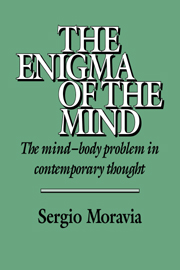Book contents
- Frontmatter
- Contents
- Preface to the English edition
- The enigma of the mind
- The enigma of the mind: Introduction to a metaphor
- 1 Toward a physical science of the mental: Feigl and the (re-)construction of the ‘mind–body problem’
- 2 The apogee of physicalism: The identity theory and materialism in the Australian school
- 3 The obscure relationship: Problems and debates surrounding the identity theory
- 4 Psychology as alchemy: The elimination of the mental in the ‘disappearance theory’
- 5 The mind as function: The functionalist approach to the mind–body problem
- 6 The mind as property and as event: The ‘reformist’ neo-identityism of Kim and Davidson
- 7 The mind as language: The linguistic turn in the mind–body problem
- 8 Speaking in many different ways: The pluralization of descriptions and explanations in the MBP
- 9 The mind as a mode of subjective experience: An interpretive model of the features of the mental
- 10 The mind as ‘subject’ and as ‘being-in-the-world’: Toward a non-mentalistic interpretation of the mental
- Appendix The mental as intentional/‘personal’ emergence: The psycho-personological perspective of Joseph Margolis
- Bibliography
- Name index
2 - The apogee of physicalism: The identity theory and materialism in the Australian school
Published online by Cambridge University Press: 05 June 2012
- Frontmatter
- Contents
- Preface to the English edition
- The enigma of the mind
- The enigma of the mind: Introduction to a metaphor
- 1 Toward a physical science of the mental: Feigl and the (re-)construction of the ‘mind–body problem’
- 2 The apogee of physicalism: The identity theory and materialism in the Australian school
- 3 The obscure relationship: Problems and debates surrounding the identity theory
- 4 Psychology as alchemy: The elimination of the mental in the ‘disappearance theory’
- 5 The mind as function: The functionalist approach to the mind–body problem
- 6 The mind as property and as event: The ‘reformist’ neo-identityism of Kim and Davidson
- 7 The mind as language: The linguistic turn in the mind–body problem
- 8 Speaking in many different ways: The pluralization of descriptions and explanations in the MBP
- 9 The mind as a mode of subjective experience: An interpretive model of the features of the mental
- 10 The mind as ‘subject’ and as ‘being-in-the-world’: Toward a non-mentalistic interpretation of the mental
- Appendix The mental as intentional/‘personal’ emergence: The psycho-personological perspective of Joseph Margolis
- Bibliography
- Name index
Summary
PLACE: THE NATURE OF PSYCHOPHYSICAL IDENTITY
In the preceding chapter brief mention was made of the Australian school of materialists. It was noted that in the later works of Feigl, especially in the ‘Postscript’ published in 1967, considerable importance is given to the theories advanced by the exponents of this school. Indeed, Australian materialism plays an extremely significant, and aggressive role on the stage of contemporary thought on the mbp and no discussion of the issue can avoid a confrontation with the radical principles it defends. The Australian school, moreover, has the merit of pointing out the extent to which a seemingly ‘technical’ and circumscribed debate on the relationship between mind and body actually touches on problems far broader in scope: the nature of the mental, the properties of man's higher functions, the method and goals of ‘true’ science in relation to the psychoanthropological universe.
As Max Deutscher once wrote, the conception elaborated by the Australian school is “physicalism … in its most recent incarnation” (Deutscher [1964] 1967, p. 83). When and how did this “incarnation” come about? A firsthand account of the events runs something like this: In 1955 U. T. Place held a series of lectures at the University of Adelaide in which he presented an identity solution to the mbp (or, more precisely, to a fairly restricted part of it).
- Type
- Chapter
- Information
- The Enigma of the MindThe Mind-Body Problem in Contemporary Thought, pp. 61 - 104Publisher: Cambridge University PressPrint publication year: 1995



